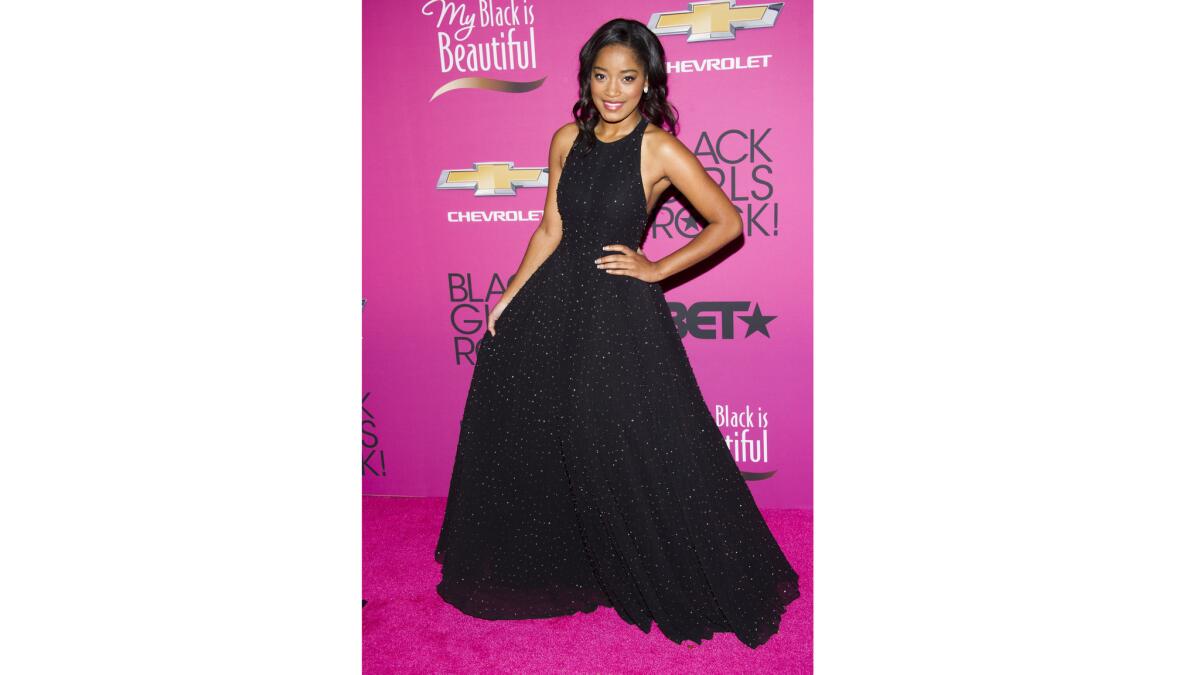Opinion: On Broadway, black Cinderella’s glass slipper is only half full

- Share via
Actress Keke Palmer celebrated another important milestone last week. After becoming the youngest person to ever host her own TV talk show, it was announced that Palmer would take on another history-making role: Broadway’s first-ever (as far as we know) black Cinderella in a production of the Rodgers and Hammerstein’s musical set to debut in September. The 20-year-old, whom many remember as the title character in 2006’s “Akeelah and the Bee,” follows in the footsteps of Brandy Norwood, who previously acted in a televised version of the “Cinderella,” alongside the late Whitney Houston.
In an interview with the AP, Palmer credited Norwood’s influence on her growing up and her wish to inspire others by stepping into Cinderella’s iconic slipper. “I feel like the reason I’m able to do this is definitely because Brandy did it on TV,” Palmer told reporters. “In me doing this, it shows everybody that everything is possible.” And Palmer is exactly right: This casting represents not just an important moment for Broadway, but for young girls, black women and everyone else.
Keke Palmer steps onto the stage at a time when Broadway continues to struggle with racial diversity. The enormously successful musical adaptation of Disney’s “Aladdin” features one of the most diverse casts in Broadway history -- but it’s questionable whether any of those actors are of Middle Eastern descent. According to a rep from the Disney, “the company is not allowed to ask potential employees about their ethnic background at any point during the hiring process,” meaning that they have a “Don’t ask, don’t tell” policy about race.
However, “Aladdin” is far from the only show with an uneasy relationship to race. In an otherwise positive review, Flavorwire’s Tyler Coates questioned the lack of diversity in Woody Allen’s “Bullets Over Broadway: The Musical.” Coates wrote, “The most glaring issue is the nearly all-white cast. Save for a sole African-American woman in the chorus...the cast is entirely white, which the New York Daily News reported...was a directive from Allen himself.”
Allen attempted to defend his casting process, saying that he doesn’t cast black actors unless he “[writes] a story that requires it.” The director continued, “You don’t hire people based on race. You hire people based on who is correct for the part.”
For a musical like “Bullets Over Broadway,” that might make sense, considering that its a period musical set in the 1920s, but Coates doesn’t buy it: “During a season in which most shows on Broadway feature colorblind casting -- with even ‘Les Misérables,’ a show set in 19th-century Paris, featuring two black actors in prominent roles -- it’s no longer reasonable to even claim ‘historical accuracy’ as an excuse for the racial disparity on stage.”
As Coates notes, Broadway is taking steps in the right direction -- especially with the success of fare like the “Fela!” and “Raisin in the Sun” with Denzel Washington -- but as Elysa Gardner of USA Today notes, the industry’s “audience remained about three-quarters white from the spring of 1998 through the spring of 2010.”
This reflects an industry where an overwhelming majority of the offerings are directed at affluent white audiences -- written, directed by and starring white people. According to The Times’ David Ng, shows that attempt to bring in an African American audience, like the recently closed Tupac musical, “Holler if Ya Hear Me,” prove a “marketing challenge” for Broadway. “Holler” proved the first “flop” of the Broadway season, with a short run that went from June 19-July 20.
Meantime, actor Samuel Jackson told USA Today that he wonders whether black audiences “will be able to afford” to come. Speaking about his role in a MLK-themed play, “The Mountaintop,” Jackson said, “The people who will see it are either affluent or black people who have saved some money for a special event, or maybe someone got them tickets.”
Keke Palmer won’t help solve Broadway’s race issues, but at a time when black actresses struggle to get cast anywhere, Palmer’s casting as Cinderella on Broadway is significant. The reason it feels so revolutionary is because of the way, as Jackson touches on, black actors and artists, as well as audiences, have historically been marginalized and shut out. This is a phenomenon that will continue past Palmer’s casting, as long as Broadway continues colorblind casting.
This month, Keke Palmer’s dreams came true, but to keep granting those wishes, Broadway needs to keep dreaming bigger.
Nico Lang is the Opinion Editor at the Daily Dot and co-editor of the “BOYS” anthology series. Follow Nico on Twitter @Nico_Lang.
Follow the Opinion section on Twitter @latimesopinion
More to Read
A cure for the common opinion
Get thought-provoking perspectives with our weekly newsletter.
You may occasionally receive promotional content from the Los Angeles Times.









